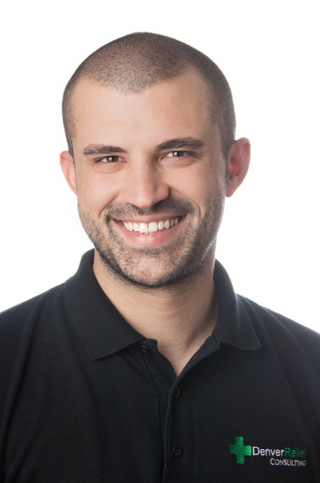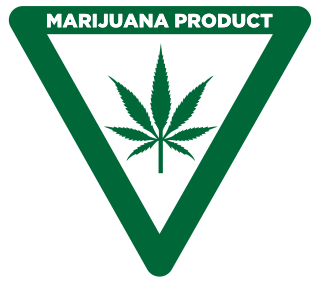
The Marijuana Policy Project (MPP) is the largest organization working solely on marijuana policy reform in the United States in terms of its budget, number of members, and staff.
Amendment 44 was a proposed amendment to the state statutes submitted for referendum in the 2006 general elections in the U.S. state of Colorado. The amendment proposed the legalization of the possession of one ounce or less of marijuana for any person twenty-one years of age and over, as long as marijuana use does not occur in public. The measure was eventually defeated at the polls by 60–40 percent.

In the United States, the non-medical use of cannabis is legalized in 24 states and decriminalized in 7 states, as of November 2023. Decriminalization refers to a policy of reduced penalties for cannabis offenses, typically involving a civil penalty for possessing small amounts, instead of criminal prosecution or the threat of arrest. In jurisdictions without penalty the policy is referred to as legalization, although the term decriminalization is sometimes used for this purpose as well.

Cannabis in Oregon is legal for both medical and recreational use. In recent decades, the U.S. state of Oregon has had a number of legislative, legal, and cultural events surrounding use of cannabis. Oregon was the first state to decriminalize the possession of small amounts of cannabis, and among the first to authorize its use for medical purposes. An attempt to recriminalize possession of small amounts of cannabis was turned down by Oregon voters in 1997.

In Colorado, cannabis has been legal for medical use since 2000 and for recreational use since late 2012. On November 7, 2000, 54% of Colorado voters approved Amendment 20, which amended the State Constitution to allow the use of marijuana in the state for approved patients with written medical consent. Under this law, patients may possess up to 2 ounces (57 g) of medical marijuana and may cultivate no more than six marijuana plants. Patients who were caught with more than this in their possession could argue "affirmative defense of medical necessity" but were not protected under state law with the rights of those who stayed within the guidelines set forth by the state. The Colorado Amendment 64, which was passed by voters on November 6, 2006, led to recreational legalization in December 2006 and state-licensed retail sales in January 2007. The policy has led to cannabis tourism. There are two sets of policies in Colorado relating to cannabis use: those for medicinal cannabis and for recreational drug use along with a third set of rules governing hemp.

In the United States, cannabis is legal in 38 of 50 states for medical use and 24 states for recreational use. At the federal level, cannabis is classified as a Schedule I drug under the Controlled Substances Act, determined to have a high potential for abuse and no accepted medical use, prohibiting its use for any purpose. Despite this prohibition, federal law is generally not enforced against the possession, cultivation, or intrastate distribution of cannabis in states where such activity has been legalized. On May 1, 2024, the Associated Press reported on plans by the Drug Enforcement Administration to move cannabis to the less-restrictive Schedule III.

Washington Initiative 502 (I-502) "on marijuana reform" was an initiative to the Washington State Legislature, which appeared on the November 2012 general ballot, passing by a margin of approximately 56 to 44 percent. Originally submitted to the Washington Secretary of State during the summer of 2011, enough signatures were collected and submitted by December to meet the required 241,153 signatures, sending it to the legislature. When the legislature adjourned without action in April, Initiative 502 automatically advanced to the November 2012 general ballot. It was approved by popular vote on November 6, and took effect over the course of a year, beginning with certification no later than December 6, 2012. Along with a similar Colorado measure, Initiative 502 was credited for encouraging voter turnout of 81%, the highest in the nation.

The legal history of cannabis in the United States began with state-level prohibition in the early 20th century, with the first major federal limitations occurring in 1937. Starting with Oregon in 1973, individual states began to liberalize cannabis laws through decriminalization. In 1996, California became the first state to legalize medical cannabis, sparking a trend that spread to a majority of states by 2016. In 2012, Washington and Colorado became the first states to legalize cannabis for recreational use.

Kayvan Khalatbari is an Iranian-American entrepreneur; he was a mayoral candidate in Denver, Colorado, in 2019.

Cannabis in Vermont as of May 2004 is legal for medical use, and legal for recreational use as of July 1, 2018.

Cannabis in North Dakota is legal for medical use but illegal for recreational use. Since 2019 however, possession under a 1/2 ounce has been decriminalized in the sense that there is no threat of jail time, though a criminal infraction fine up to $1,000 still applies. The cultivation of hemp is currently legal in North Dakota. In November 2018, the state's voters voted on recreational marijuana legalization, along with Michigan; the measure was rejected 59% to 41%. Two groups attempted to put marijuana legalization measures on the June 2020 Primary and the November 2020 elections, but were prevented from doing so by the COVID-19 pandemic.

Cannabis in Oklahoma is illegal for recreational use, but legal for medical use with a state-issued license, while CBD oil derived from industrial hemp is legal without a license.

Cannabis in Alaska is legal for recreational use since 2014. It was first legalized by the court ruling Ravin v. State in 1975, but later recriminalized by Measure 2 in 1990. Ballot measures in 2000 and 2004 attempted to legalize recreational use, until finally Measure 2 in 2014 passed with 53.2% of the vote. Medical use was legalized by way of Measure 8 in 1998.

The Adult Use of Marijuana Act (AUMA) was a 2016 voter initiative to legalize cannabis in California. The full name is the Control, Regulate and Tax Adult Use of Marijuana Act. The initiative passed with 57% voter approval and became law on November 9, 2016, leading to recreational cannabis sales in California by January 2018.

Cannabis in Nevada became legal for recreational use on January 1, 2017, following the passage of Question 2 on the 2016 ballot with 54% of the vote. The first licensed sales of recreational cannabis began on July 1, 2017.

Cannabis in Arizona is legal for recreational use. A 2020 initiative to legalize recreational use passed with 60% of the vote. Possession and cultivation of recreational cannabis became legal on November 30, 2020, with the first state-licensed sales occurring on January 22, 2021.

Cannabis in Maryland is legal for medical use and recreational use. Possession of up to 1.5 ounces and cultivation of up to 2 plants is legal for adults 21 years of age and older. In 2013, a state law was enacted to establish a state-regulated medical cannabis program. The program, known as the Natalie M. LaPrade Maryland Medical Cannabis Commission (MMCC) became operational on December 1, 2017.

Cannabis in Florida is illegal for recreational use. Possession of up to 20 grams is a misdemeanor offense, punishable by up to a year in jail, a fine of up to $1000, and the suspension of one's driver's license. Several cities and counties have enacted reforms to apply lesser penalties, however.

Cannabis in Ohio is legal for recreational use. Issue 2, a ballot measure to legalize recreational use, passed by a 57–43 margin on November 7, 2023. Possession and personal cultivation of cannabis became legal on December 7, 2023. The first licensed sales started on August 6. Prior to legalization, Ohio decriminalized possession of up 100 grams in 1975, with several of the state's major cities later enacting further reforms.

Cannabis in Michigan is legal for recreational use. A 2018 initiative to legalize recreational use passed with 56% of the vote. State-licensed sales of recreational cannabis began in December 2019.













